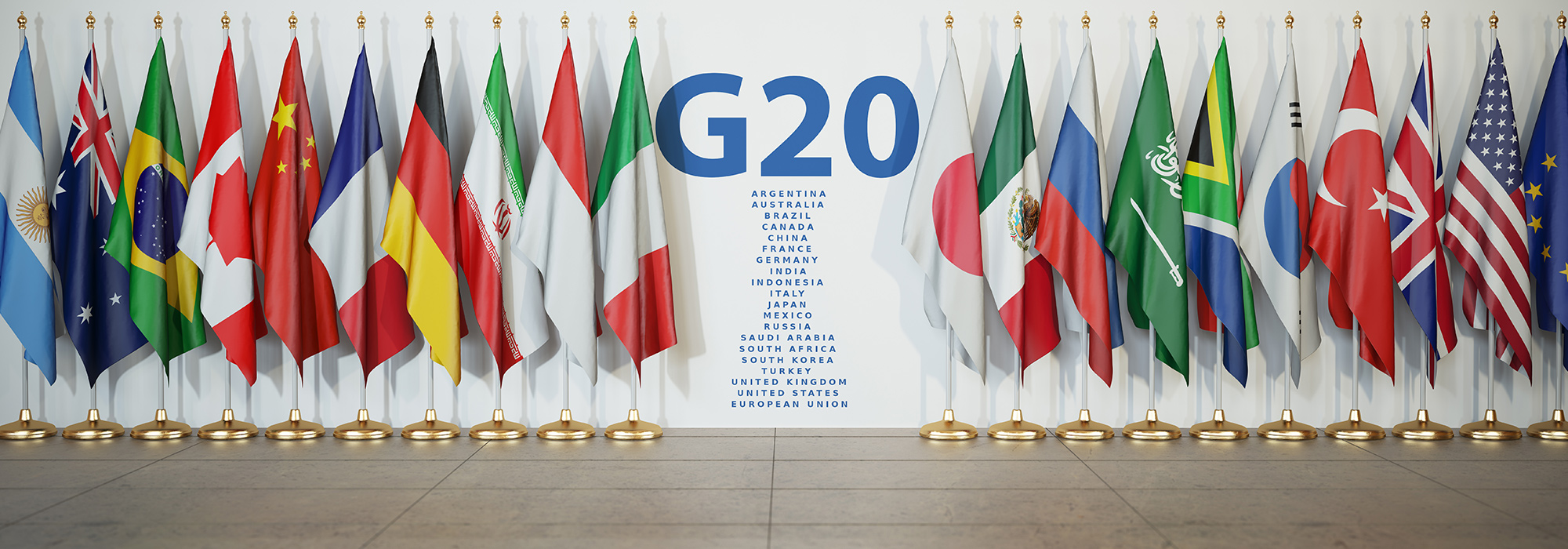
Leaders in Pittsburgh last September designated “the G20 to be the premier forum for our international economic cooperation.” It is critically urgent, at this moment in the G20’s development, to build on the G20’s initial successes and advance its credibility and effectiveness. This can best be achieved by focusing on a small number of pressing priorities, and by coordinating action with early, specific and beneficial results. It requires zealous determination to refrain from adding new subjects to a G20 agenda that is already full. It demands a united resolve among G20 leaders to avoid deadlines they cannot meet and to resist commitments they cannot keep. The G20, after all, remains something of an experiment in collective leadership and enhanced coordination. It will be properly judged not by the promises it makes, but by the progress it delivers.
The G20 forum has performed remarkably well through the global recession. But, as the crisis abates in some economies, there is a real and ominous danger that complacency or faltering political resolve will undermine recovery. If the gains from renewed growth are to be sustained and fully shared, the G20 will need to fortify public trust in international governance generally — and in financial governance especially. Improving the credibility of international governance is a necessity. This can best be achieved if the G20 focuses on a few key priorities and achieves practical, measurable results.
The Canada-Korea G20 Seminar addressed these priorities and outcomes under four headings: recovery; financial regulation and reform; energy security and climate change financing; and trade. Discussions were enriched by diverse perspectives and emphases, but they exhibited notable consensus on crucial policy issues now confronting G20 leaders. As hosts of this year’s summits, Canada, on the basis of the stability of its financial institutions, and Korea, on the basis of its impressive growth trajectory, have a unique opportunity to help shape the agenda.
Economic recovery shows surprising strength in some countries, but it remains fragile, unevenly shared and vulnerable to reversal. The most serious hazards and impediments to global economic stability and growth are current-account imbalances between surplus and deficit countries, and budgetary deficits that in many countries are growing worse. Recovery cannot be sustained unless these acute imbalances are corrected and fiscal discipline is exercised. More broadly, transition strategies for exiting stimulus programs must be coherently aligned with programs to correct these imbalances and to foster sustained growth. Higher target rates for inflation are not the answer.
Current-account imbalances call for prompt, coordinated attention. Specifically, surplus countries (notably China, but also Germany and Japan) must be encouraged to accelerate domestic consumption and public spending; deficit countries (notably the United States but also the United Kingdom) must adopt prudent fiscal policies in the medium term, restrain consumer demand and generate more exports.
Such measures will no doubt prove delicate and difficult. “Naming and shaming” will not succeed. But G20 leaders and their ministers must address these imbalances frankly and constructively. Inaction on correcting these major imbalances would undercut the effectiveness of other G20 measures.
To undertake its role more effectively as the “premier forum” for managing global economic affairs, the G20 should consider enhancing its relations with non-member countries by engaging regional forums in dialogue and policy cooperation. Additionally, peer review (and peer pressure) in regional forums might constitute one element in a G20 payments-rebalancing strategy. Promoting greater flexibility in exchange rates, together with structural reform for fiscal sustainability, would be another.
To undertake its role more effectively as the “premier forum” for managing global economic affairs, the G20 should consider enhancing its relations with nonmember countries by engaging regional forums in dialogue and policy cooperation. Additionally, peer review (and peer pressure) in regional forums might constitute one element in a G20 payments-rebalancing strategy. Promoting greater flexibility in exchange rates, together with structural reform for fiscal sustainability, would be another.
True recovery will be secured only if these imbalances, particularly those between the US and Chinese economies, are effectively addressed. G20 leaders should put in place measures to monitor and measure progress on agreed commitments. They should take care, moreover, to concentrate on a few critical commitments and resist adopting an overly broad agenda that will only deplete and divert political will.
In addition to the need to secure an efficient international monetary system, five imperatives of financial regulation compel immediate and continuing G20 attention:
- Establish capital reserve requirements for banks. Setting ratios too high stifles investment (and can drive lending into unregulated shadow sectors). Ratios set too low can cause the harms already experienced. The G20 should reach consensus on a sensible level (8 percent?) and facilitate shared assessments. Quick action here is more important than laboriously pursuing and debating an elusive “just right” ratio number.
- Subdue the procyclical dynamic of capital supply and demand. Under prevailing conditions, lenders tend to ramp up lending and accept higher risks in boom times — only to intensify busts by withholding credit when times turn bad. Regulators might counter these swings by requiring more capital accumulation in good times (contingent capital securitization), and by imposing forward-looking loan-loss provisions.
- Improve the capital infrastructure of financial markets, for transparency and responsibility. This will involve orderly exchanges and central counterparty arrangements, recognizing the dangers of contagion that can amplify financial crises across the world. (Problems in small countries like Greece could adversely affect the entire system.)
- Systemic or sectoral risks can arise and damage even the banks that seem trouble-free. (Example: the US housing market.) This implies the need for “macroprudential monitoring” mechanisms in G20 countries to contain credit problems. (Canadian authorities exercised such prudence when they recently restrained mortgage lending by introducing modest but noticeable changes in borrowing limits. As the examples of Canada and the United States also attest more broadly, interest deductibility on residential mortgages induces indebtedness, discourages savings and does not demonstrably expand home ownership.)
- “Too big to fail.” Various solutions have been advanced, including “living wills” prescribing how big banks would be wound up in a crisis, as well as specific restrictions on banks. None has been widely endorsed. One alternative: amend bankruptcy laws to accommodate the unique characteristics of banks and possibly include a support fund for this to which all banks would contribute. This change would require legislation and may be difficult, but it merits consideration.
Financial reforms generally should be principle-based, not rule-based. A proliferation of rules adds complexity without clarity. The emphasis overall on regulatory reform should be on greater efficiency. More regulation is not necessarily better, and one size does not fit all.
The International Monetary Fund (IMF) seems not well placed to perform a stronger, more systematic surveillance of the financial industry. The Financial Stability Board might be more useful here, along with rigorous mutual assessment. The IMF, meanwhile, must quickly remedy its outdated quota practices. The IMF quota allocation should reflect the economic significance of each member in the context of the global economy. Enhanced participation by IMF governors in decision-making should be a key goal of institutional reform, along with a more diverse composition of the IMF staff and merit-based appointments to top management posts.
The Copenhagen conference represented a failure of process that should be addressed by G20 leaders. The climate change negotiating challenge is not in itself central to the G20, but leaders, nonetheless, should encourage a more productive negotiating approach.
More than that, the G20 can integrate green-economy thinking more fully into energy security and economic discussions. The most promising strategies stress “opportunity” over “obligation” and deliver on commitments to phase out pernicious fossil fuel subsidies. G20 governments should be encouraging private investment in energy conservation.
Comprehensive climate change action calls for agreed methods of carbon pricing. Unilateral moves are of limited attraction, given the impact on competitiveness. The United States and China together produce 42 percent of greenhouse gas emissions. It is hard, therefore, to imagine climate change progress without explicit and coordinated US-Chinese policy changes.
Recession has aroused understandable public discontent with conventional notions of globalization — and has inspired new pressures for protectionist measures. G20 governments must take steps to restore confidence in the wisdom of freer trade. These steps must start by recharging the “standstill agreement” with new language and more vigorous commitment. G20 economies cannot afford to backslide into protectionism.
Whether the G20 should proclaim any further endorsement of the Doha Round of global trade talks is an open question. In particular, G20 leaders should not affirm Doha deadlines they know will not be met. Unkept commitments only diminish confidence in open trade and weaken public trust in the G20 itself. It would be a grave mistake to indulge in futile promises of negotiating success. It may be preferable to reinforce present rules (with stronger monitoring of standstill commitments by the World Trade Organization, for example) and pursue bilateral and regional arrangements to maintain liberalization momentum, while seeking ways to conclude the Doha Development Agenda as soon as possible.
The G20 can also act to restore confidence in the existing global trade regime by prohibiting discriminatory government procurement practices; restricting the application of trade remedies — and specifically of antidumping measures; sharing information to impart transparency to non-tariff barriers; and banning any tariffs above the levels in effect in November 2008.
Photo: Shutterstock










